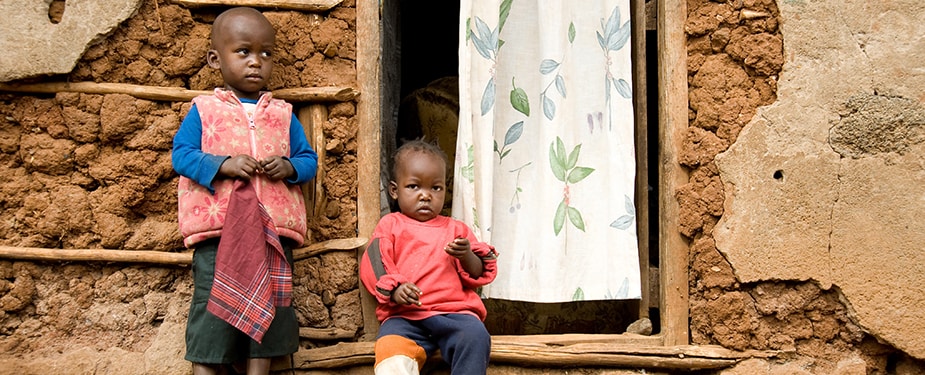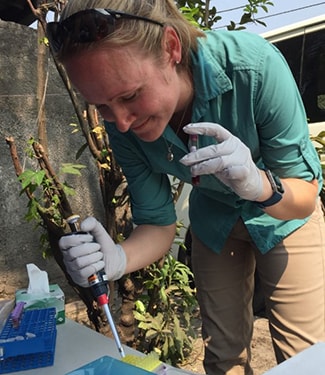Innovation in the Field: The Measles-Rubella Box
September 6, 2018

Children in a refugee camp in Kenya. Photo: David Snyder, CDC Foundation.
What if you could put a laboratory into a box small enough to carry with you to the most remote corners of the world? What if that box contained cutting-edge diagnostic technology and required only a laptop battery for power?
And what if you could then use that box to detect a child’s immunity to vaccine-preventable diseases like measles and rubella, or even to confirm clinical cases in reported outbreaks, all in less than an hour?
Such a box actually exists, and it’s called the Measles-Rubella Box (MR Box). While the technology is new and still developing, it was recently tested in Kenya and the Democratic Republic of the Congo (DRC) to see how well it works in real-life situations.
In DRC, all the measles and rubella tests currently have to be sent to the national laboratory in Kinshasa. It’s a big country, and transporting blood samples can be difficult. Even the fastest results take a minimum of a week to get back.
TESTING TECHNOLOGY IN THE FIELD

Dr. Aimee Summers preparing whole blood samples for DMF-ELISA at a Health Center in Biyela, Kinshasa Province, DRC. Photo: Alaine Knipes.
The first tests of the MR Box took place in a Kenyan refugee camp in summer 2016, where CDC Emergency Response and Recovery experts Dr. Aimee Summers, Dr. Eugene Lam, and Dr. Alaine Knipes, along with a team from the University of Toronto’s Wheeler Laboratory, used the boxes to check people for immunity to measles and rubella. Last September, Dr. Summers and Dr. Knipes arrived in Kinshasa, DRC, to lead a second set of field tests.
They again traveled with scientists from the University of Toronto, who designed and developed the innovative technology. They had come to DRC to figure out if the MR Boxes could be used to confirm active measles and rubella infections to help stop outbreaks faster.
“In DRC, all the measles and rubella tests currently have to be sent to the national laboratory in Kinshasa. It’s a big country, and transporting blood samples can be difficult. Even the fastest results take a minimum of a week to get back,” says Dr. Summers.
The new test has the potential to solve this issue. It’s portable, easy to use and – at less than a dollar per chip – affordable. It’s also compact, weighing less than 11 pounds. The technology inside each box, called digital microfluidics-enzyme-linked immunosorbent assay (DMF-ELISA), or “ELISA on a Chip,” has some distinct advantages over other technologies used to detect measles and rubella. It can test samples from up to four people at the same time and yields results in less than an hour – much more efficient than transporting blood samples to the national lab and waiting several days for laboratory results.
“Measles spreads very rapidly, meaning that every minute counts,” says Dr. Summers. “Having a technology that can give us immediate answers in the field is definitely a game changer.” Because measles is highly infectious, delaying public health response by several days can lead to significant expansion of outbreaks.
AN INNOVATIVE PARTNERSHIP
Disease detectives from DRC’s CDC-supported Field Epidemiology Training Program (FETP) were integral to the testing process, which involved long days going from house-to-house in Kinshasa. “The FETP residents and graduates tirelessly knocked on doors, getting up early and working late, taking time away from their ‘day jobs’ to navigate to households using GPS, collect blood samples, and fill out electronic data forms,” notes Dr. Knipes.
The research partnership also included collaboration with the CDC office in DRC, as well CDC’s Global Immunization Division (GID) and Division of Viral Diseases (DVD). The project received support from a CDC Innovation Fund award and from GID research funds.